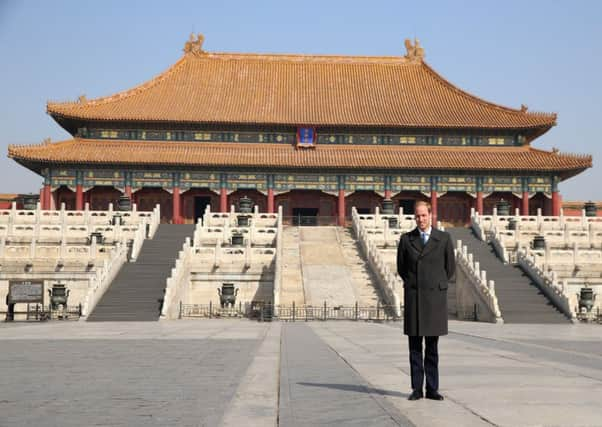Leader: Royal China visit helps build relationship


There are some fairly large obstacles he will have to overcome. And it would be interesting to know what his father thinks of the trip. No doubt remarks penned by Prince Charles in a diary entry that was leaked will still be in the memory of the Chinese government – in it he described Chinese officials as “appalling old waxworks”.
Prince Charles also never visited China, and angered the Chinese by hosting the Dalai Lama at Clarence House. Just to add to any family history difficulties facing Prince William, his grandfather, Prince Philip, once described Beijing as “ghastly”.
Advertisement
Hide AdAdvertisement
Hide AdAnd for the Chinese the chances are that the bad family history goes back even farther than that. The British are notorious for razing the Summer Palace to the ground in 1860. Throw in Hong Kong and it is obvious that this could be an uncomfortable trip for Prince William. So why is he there?
China is a country of contradictions. It has a very strong autocratic Communist party ruling government. There are still propaganda media organisations who decry the cultural values of the West and accuse the West of plotting to undermine Chinese society.
To underline that the authorities do not think this an idle threat, the country is firmly closing off its domestic internet from any messages and services it does not like. YouTube, Facebook and Twitter are banned from its cyberspace.
But it is also the biggest trading nation in the world, importing and exporting more than anyone else, with a fast-growing affluent middle class which is a huge market for whisky, cars, and just about everything else. An although it has slowed down a bit in recent years, it was a massively expanding economy and is still forecast to overtake the American economy as the biggest in the world.
So cynics would say that is the reason why our view of its civil rights abuses are conveniently pushed to the backs of our minds – in the end we are more interested in their money and we are prepared to suspend our moral judgement just as long as the cash keeps flowing. And that of course the Chinese are aware of this and exploit it.
But there is also a pragmatic view to be taken. It is true that nations that trade together have a relationship that is seen as being mutually beneficial, there is a flow of more than just cash in both directions. Although the democratic changes in Hong Kong may fall far short of what we would wish for, they are still democratic progress.
So in the long term, trading together has more chance of improving the global situation and ensuring peace bound up with mutual prosperity than not trading. It is only when we are capable of a dialogue that a dialogue can take place.
Home ownership is a hot topic
Fuelling property booms can be a dangerous thing, as was evidenced by the financial collapse sparked by the US mortgage scandal in 2008, so governments would do well to be wary.
Advertisement
Hide AdAdvertisement
Hide AdIt would perhaps be in our collective national interest if we became far more European in our outlook and rented rather than sought ownership.
But the difficulty with that strategy is that the property is still owned, it just concentrates property ownership in the hands of a relative few. Essentailly that means that all but the wealthy are priced out and that was the way it worked for centuries. Property ownership for the majority is now widely seen as a laudable ambition because it is a genuine building block to a more equitable society.
It allows parents to pass on a legacy to their children and if it is denied then great wealth very quickly gets concentrated in certain families. There is also a view that property owners are more engaged in their neighbourhoods and in society in general. In the broad view, the more people that own property the better.
And that was a path that was denied to many because of the financial crash, now that bigger deposits are required and the rules for obtaining a mortgage have, rightly, been tightened.
So both Nicola Sturgeon and David Cameron’s low-cost housing initiatives are to be welcomed. The First Minister unveiled a £70 million fund to help low and moderate income families in Scotland buy their first homes, and Mr Cameron has pledged to double to 200,000 the number of cut-price starter homes to be built under a Conservative scheme in England. But let’s just make sure heat can get taken out the market should prices soar.
FOLLOW US
SCOTSMAN TABLET AND MOBILE APPS